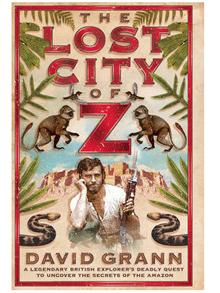David Grann, The Lost City of Z
reviewed by Danielle L. Parker

The Lost City of Z Publisher: Doubleday, 2009 Length: 338 pages ISBN: 978-0-385-51353-1 |
The legend of El Dorado and a drenched-in-gold lost civilization started with the Spanish. We know how the conquistadors reacted to the whiff of gold. An early expedition lead by one of the notorious Pizarros rampaged through the jungle, torturing — setting on fire, throwing to the hungry dogs — bewildered Indians who couldn’t tell the Spanish where the city of gold was. The Amazon jungle took vengeance on the conquistadors in turn.
But reports trickled back, some from seemingly credible witnesses such as priests, of that lost city.
Percy Fawcett was an Englishman with a mania for exploration. Coming from an aristocratic bloodline impoverished by a drunken spendthrift ancestor who lost two fortunes, exploration was also how he earned a precarious living for himself and his mostly abandoned wife and children.
The Royal Geographic Society of that pre-war era was intent on mapping the world. The Society trained explorers — you could really train to be an explorer — and sent their protégés on various expeditions in remote parts of the world. Fawcett was duly trained and hired to map the border between Bolivia and Brazil. He came back a hero, having completed the work a year early.
Yet disturbing facets of his character showed in the expeditions he led. Fawcett was a physically iron-hard man with no mercy for others. Physical weakness, in his mind, equated to moral deficiencies, cowardliness and lack of effort. He had nothing but scorn for the suffering man. Fawcett drove expedition after expedition into death.
On some expeditions, more than half his men died from malaria, yellow fever, insects and parasites. On one, he drove his men into the Amazon jungle until they were dying of starvation, having been a month without food. Only the chance appearance of a deer saved them.
A famous biologist with a Fawcett expedition suffered nightmarish agonies from an infestation of maggots in his rotting flesh. When the man became delirious and could not move, Fawcett prepared to abandon him. But fortunately for the victim, a local with a mule happened by, and Fawcett paid to have his unwanted human baggage carried away.
All expected the hideously suffering man to die. Fawcett returned from his expedition and branded the famous biologist a “coward” and a “weakling.” But the biologist was saved by kind people who squeezed every hideous maggot out of his flesh and nursed him back to health.
When Murray the biologist finally made his way back to civilization, he was enraged to hear how Fawcett had libeled him. He told his own story of abandonment and inhuman cruelty in the jungle. But the scandal was hushed up by the Royal Geographic Society. Fawcett carried on, along with his usual expedition attrition rate.
Fawcett’s interest in the myth of El Dorado in the jungle turned into obsession after World War I. But times were hard, and he had trouble persuading the Royal Geographic Society to fund his search for the lost city he had dubbed “Z.” American backers finally came to his rescue. In 1925, Fawcett set out with his young son, who worshipped his famous father, and the young man’s staunch friend, who worshipped young Jack Fawcett in turn. With these two inexperienced companions and his limited funds, Percy Fawcett intended to find that mirage city in the jungle.
But the Amazon swallowed him. Percy Fawcett was never heard from again.
This story is more than anything a fascinating look at obsession. Those men who are driven to challenge the unknown, to push into new frontiers, are a special breed. Vainglory is without a doubt part of the makeup, but there’s more. Fawcett sacrificed his family, many lives, and what little money he had to his life-time obsession.
Such men make the history books, but they are never comfortable companions. Percy Fawcett at last received what he had forced on so many weaker men: death in the jungle.
It’s strange indeed we have at last found that lost city in the jungle. Recent archeological discoveries detailed by the author reveal an Amazonian civilization that now forms the earliest known in the Americas. A vast network of cities with moats and palisades has been discovered. These earliest inhabitants found a way to develop a rich “black earth” from the Amazon’s poor soil.
Percy Fawcett’s lost city of Z existed, though it was not gold. Perhaps he reached it before he died.
The Lost City of Z is a fascinating book. Read it along with a more modern Amazon adventure classic, Paddle to the Amazon. You’ll recognize that obsessional you-can-drop-like-flies-but-I’m-getting-there mind-set in both protagonists. Read it and think.
Copyright © 2011 by Danielle L. Parker

